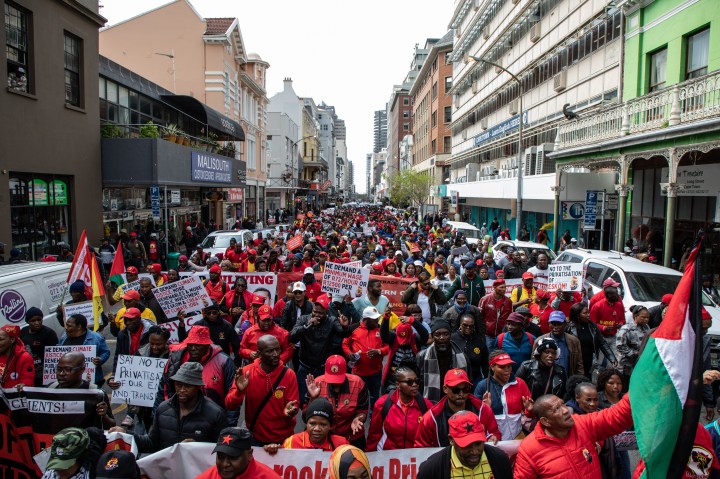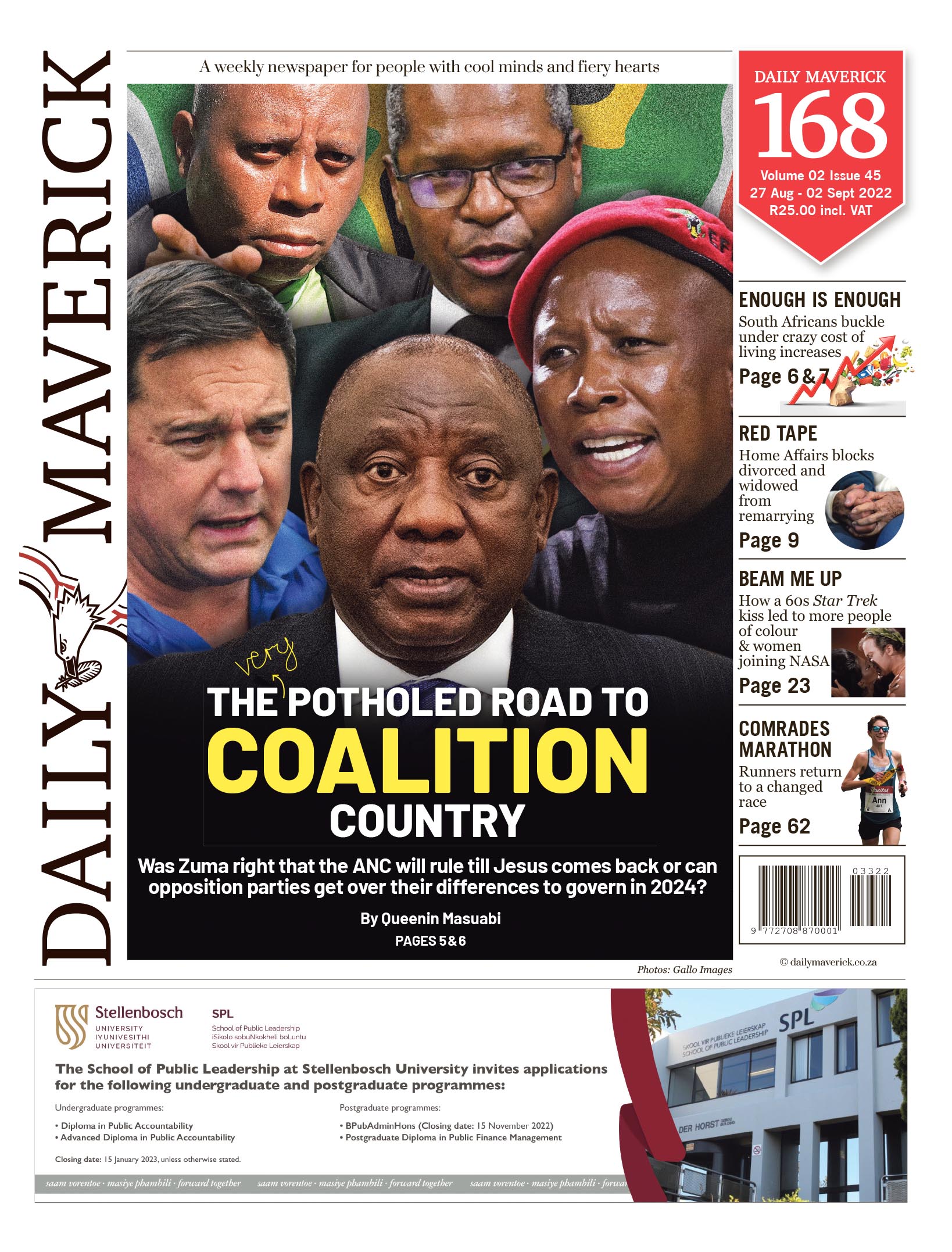RISING EXPENSES
Cost of living in SA reaches critical highs for rich and poor alike

Last week thousands of people took to the streets to protest against the increasingly unaffordable cost of living. How much more pain must cash-strapped South Africans take — and what can be done to turn around a very worrying situation?
Every week brings new confirmation of the dire situation in which South Africans find themselves. On 24 August, data from Statistics South Africa showed consumer inflation — at 7,8% — had reached its highest rate in 13 years. The hikes in prices for individual goods and services almost beggar belief: within a single year, the cost of a litre of petrol has shot up by 56.2%.
An analysis by DM168 of the price difference in basic grocery items as recently as five years ago brings it all home. In 2017, a loaf of brown bread cost R10.40. Today, that same loaf will set you back R17.99. Other prices have doubled in this time. You could buy two packets of yeast for R6.40 in 2017; now you will need R12.
“We can’t live like this. This is totally unsustainable,” trade unionist Zwelinzima Vavi told a press conference this week. Few would disagree.
The unions speak out — except about one critical issue
To show the government the strain that workers are under, trade union federations Saftu and Cosatu mobilised thousands to march in major cities this week, demanding state intervention in the cost of living crisis.
Everything from public sector salaries to rolling blackouts and interest rates was on the unions’ agenda as contributing to the current crisis. Absent: the conflict in Ukraine. Yet, if the unions want to see their members’ wallets spared further pain, there is a strong argument that one of their major current moves should be pressuring the South African government to call for an immediate end to the invasion of Ukraine by Russia.
Instead, the stance of South African unions regarding the conflict in Ukraine has been ambiguous. In May, the Saftu congress adopted a resolution opposing “imperialist war” and standing in solidarity with “Russian and Ukrainian workers”, but without ever explicitly condemning Russia. Cosatu’s top body, meeting in the same month, similarly asserted that “war cannot be condoned”, without explicitly criticising the Russian invasion.
Individual unions, meanwhile, have taken more pro-Russian stances. The National Union of Metalworkers (Numsa), for instance, in July described the conflict in Ukraine as being led by “the Empire of the United States of America”.
While economists say there are many complex reasons behind the cost of living crisis, including the ongoing impact of disrupted global supply chains caused by Covid-19, there is agreement on one point: Russia’s invasion has directly and indirectly driven up fuel and food costs around the world.
Cost of living crunch is global, but not all countries are in the same bread basket
To give one example, South African consumers seeking to understand why their cooking oil is 45% more expensive than at this time last year — according to Nielsen IQ — should look partly to the fact that both Ukraine and Russia are among the world’s top oilseed exporters.
Good news ahead for the petrol price
One of the immediate effects of the war in Ukraine was a spike in petrol and diesel prices globally, as a result of Russia being a major producer of the world’s oil.
The petrol price increase has been passed on to local consumers with painful results: Vavi estimated this week that the average minibus-taxi user in South Africa is now paying about R168 more for their daily commute than they were last year. Taxi fares are currently consuming more than a third of minimum-wage workers’ salaries.
But in recent weeks a drop in the price of Brent Crude oil has brought some relief, which is mercifully likely to continue at local petrol pumps. DM168’s Ray Mahlaka has reported that the petrol price could drop by as much as R2.60 a litre in early September.
Petrol and diesel prices are falling: Why it’s happening and can it continue?
What will be critical is ensuring that these petrol savings are reflected in adjusted taxi prices. When prices drop, the reality is that local consumers do not always experience the benefits they should. This is currently a concern when it comes to the cost of groceries.
Are our food prices higher than they have to be?
The Competition Commission is currently investigating food prices to determine whether retailers are taking undue advantage of external issues.
Even allowing for the impact of the war in Ukraine, the astronomical price of sunflower oil is one example. The commission’s Sipho Ngwema says that this increase may be opportunistic, in part from retailers as the oil prices do not seem to match the current seed prices.
Visit Daily Maverick’s home page for more news, analysis and investigations
Something similar has happened in the past with bread, with wholesale cost reductions not being passed on to consumers. This is commonly referred to as the “rocket and feather effect”, whereby prices are quick to increase and slow to decline because there is cost inflation in the value chain. The Competition Commission’s current concerns include a wide farm-to-retail spread in prices, large price differences between regions for basic fresh produce and growing margins at the processor and retailer level.
An ongoing investigation by the commission found a staggering increase in the wholesale price of tomatoes.
The average price of tomatoes increased from R5.95 per kilogram in May 2022 to R12.48 per kilogram in July: a spike of 109% in two months.
There is some good news, but also some more bad news
The good news is that South Africans might have already experienced the worst of food inflation. Paul Makube, senior agricultural economist at FNB, told DM168 the country had “ridden the wave”, and that the main challenge ahead was the droughts in Europe and China.
The bad news? Makube warns that the recent outbreak of foot-and-mouth disease in local cattle may see a short-term spike in the price of red meat.
Vavi cited research this week suggesting that, even for middle-class professionals, salaries are now depleted within five days of landing in bank accounts. There is a sense that wages are not increasing in line with inflation — and that sense is backed by data. Independent economist Elize Kruger says that, for three of the past five years, if the forecast for 2022 is used, average take-home pay did not keep up with inflation.
Kruger points to the BankservAfrica Take-home Pay Index (BTPI), which shows that the average nominal salary dropped from R15,570 in February 2022 to R14,600 in June 2022. The BTPI is calculated by dividing the total value of all salaries paid each month by the number of employees.
Shergeran Naidoo, BankservAfrica’s head of stakeholder engagements, says June was the second consecutive month in which nominal salaries remained below the R15,000 mark, and that salaries were 1.8% lower compared with a year ago.
Meanwhile, those interest rates keep going up and up
The unions say that the raising of interest rates by the South African Reserve Bank (Sard) is making servicing debt on housing and cars increasingly unaffordable, leading to billions in defaulted loans from local consumers in the past few months alone. The Sarb has already raised interest rates by 200 basis points since November last year, moving the prime lending rate (the benchmark rate for bank loans) from 7.25% to its current level of 9%.
Unions are strongly opposed to further hikes in interest rates. But using interest rates in this manner is one of the only tools available to try to curb inflation. The generally accepted view is that inflation is the result of a gap opening up between the supply of goods and the demand for them. The Sarb has to try to cool down the whole economy, by making cash more expensive so that supply can catch up with demand.
There is, however, one positive from raising interest rates. Though it makes borrowing money more expensive, it improves returns for those looking to invest. That makes South Africa a more attractive investment destination — which could increase foreign inflows of cash and have a positive effect on the economy at large. DM168
This story appeared in our weekly Daily Maverick 168 newspaper, which is available countrywide for R25.



















 Become an Insider
Become an Insider
Comments - Please login in order to comment.